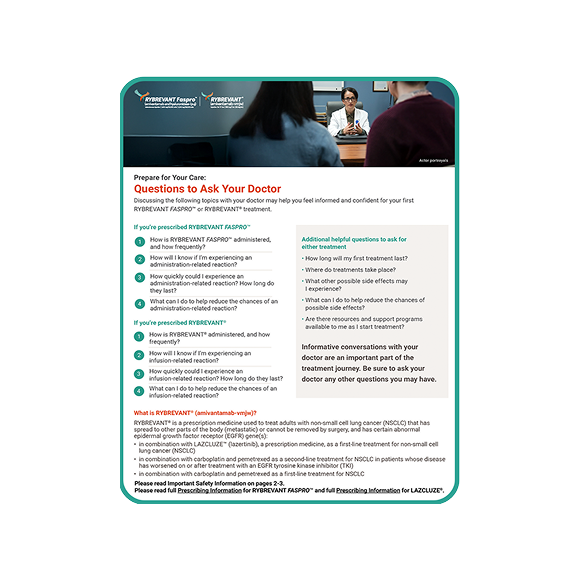Tips to help you prepare for your infusion appointments
Drink plenty of water the day before and have a good breakfast on infusion day.
Bring a pillow and blanket for extra comfort.
can last several hours, so make sure you’ve set aside enough time for your appointment. Ask your care team about how long your infusion will be.
Bring a book, game, puzzle, music, or other entertainment to help pass the time.
Ask the office if it’s okay to bring a drink and snack with you in case you get hungry.
Pay close attention to how you feel during an infusion, and make sure to tell your care team if you experience any discomfort. They know how to help.
Consider setting up transportation to and from the infusion center. You may receive medicines before your infusion that can make you drowsy. If you need help setting up a ride, reach out to your family and friends.
Your care team may give you allergy medicine, a fever reducer, and a steroid to help reduce the risks of serious from the infusion.
Wear loose clothes for comfort and so your care team can easily reach the infusion area of your body.
If you have any other questions about your infusions, ask your care team.
Tips to manage your treatment experience
It's important to work with your care team before treatment to help lower the risk of possible side effects. Members of your care team, including your dermatologist, nurse, nurse practitioner, pharmacist, and physician assistant, can help.
Daily, at-home care options to discuss with your care team
These steps may lower the chances of skin-related side effects such as rash or infected skin around the nail, or other side effects. Talk to your doctor about what steps are right for you.

Other medicines
- Oral and/or topical antibiotics may be prescribed to reduce risk of skin-related side effects
- Medicine to lower your risk of blood clots will be prescribed for the first four months of treatment if you are prescribed RYBREVANT® in combination with LAZCLUZE®
Make sure to tell your doctor about any other medicines you are taking. Consider using a pill box to help you organize your medicines.
Mild, ceramide-based moisturizer (such as La Roche-Posay Lipikar or CeraVe†‡)
Use on your face and body (except scalp) at least once a day.
Limit direct exposure to sunlight
Wear protective clothing and sunscreen with SPF ≥30.
Antiseptic cleanser (such as chlorhexidine 4%)
Use to wash your fingernails and toenails once a day.
†Talk to your doctor about what is right for you.
‡All trademarks are property of their respective owners.
Other tips to help throughout treatment
- Consider bathing/showering with warm or cool water (not hot water)
- Use mild soaps and shampoos for sensitive skin
- Use laundry detergents made for sensitive skin and without perfumes
- Wear soft, loose-fitting clothing
- Wear gloves during activities that could cause nail infection (for example, cleaning)
- Eat a balanced diet
- Talk to your doctor about activities that feel right for you
- Seek out support from your family, friends, care team, and/or support groups
During treatment, your care team can help prevent or manage side effects
It's important to tell your care team about side effects right away, if you:
- First experience of side effects
- Feel that the side effects are affecting daily activities
- Have been treating side effects according to your doctor's instructions but they do not improve
Pausing, decreasing the dose, or stopping treatment may be needed in some cases to help manage side effects.
Also, tell your doctor if you are pregnant or plan to become pregnant. RYBREVANT® and LAZCLUZE® can harm your unborn baby.


Savings & support
Once prescribed a RYBREVANT®-based treatment, connect with a Care Navigator for your support needs.
The support and resources provided by RYBREVANT withMe are not intended to provide medical advice, replace a treatment plan you receive from your doctor or nurse, or serve as a reason for you to start or stay on treatment.
*Mutations include exon 19 deletion or exon 21 L858R substitution mutations.
EGFR+ = mutated epidermal growth factor receptor; NSCLC = non–small cell lung cancer
Doctor Discussion Guide
Tips and example questions for having a helpful discussion with your doctor.


Side effects
There are side effects that you may experience during treatment with RYBREVANT® + LAZCLUZE®.



